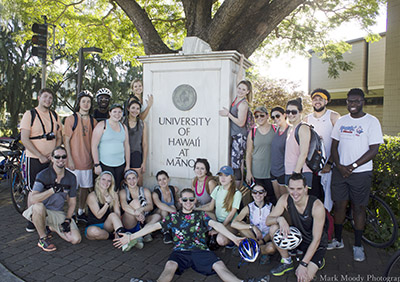During winter break, a group of 20 students and three faculty members took the opportunity to travel to Hawaii from Jan. 5-19. The trip, open to all majors, was partially assisted with funding from Yankee Candle sales, a Green Turtle happy hour, and proceeds from the concession stand at sporting events.

In the first week the students visited Waikiki, and in the second week they visited both Hilo and Kona. The trip was not simply for pleasure, the students also participated in activities that helped to offer credit for an Environmental Science class. The trip was led by Keith Johnson, assistant professor of biology, who at one point resided in Hawaii.
While on the trip students participated in a service project, cleaning plastic out of the sand at Hanauma Bay, and finishing with 14 pounds of trash. The students learned about the Trash Vortex, which is an area the size of Texas in the north Pacific.
The Trash Vortex has an estimated six kilos of plastic for every kilo of natural plankton; along with other slow degrading garbage. It swirls slowly around like a clock and is choked with dead fish, marine mammals and birds who get snared, according to Greenpeace International.

Bryson Barksdale, president of M.I.L.E, SGA senator and one of the travelers, explained how good it felt to sit back and live in the moment, all the while satisfying a science credit.
The group visited the famous green sand and black sand beaches. They also saw waterfalls, went snorkeling and visited the Pearl Harbor Memorial site. They also got the chance to overlook Kilauea, an active volcano in Hawaii Volcanoes National Park that has been continuously erupting since 1983.
Though it may have seemed like another continent or country, Hawaii is part of the United States. Barksdale said, “Even though it’s an American state, they have their own culture down there, small things like Aloha always being said for hello and Mahalo for goodbye, and everyone said it regardless of race.”
Barksdale explained that the life lessons he learned were that you can live with little, and that we need to appreciate the environment because it is much bigger than all of us.

























































